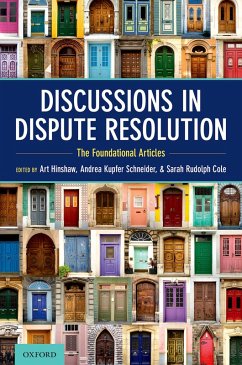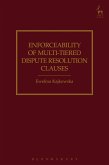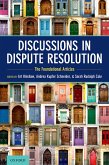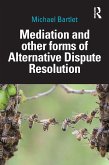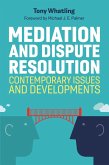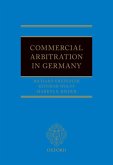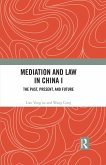Discussions in Dispute Resolution (eBook, ePUB)
The Foundational Articles
Redaktion: Hinshaw, Art; Cole, Sarah Rudolph; Schneider, Andrea Kupfer


Alle Infos zum eBook verschenken

Discussions in Dispute Resolution (eBook, ePUB)
The Foundational Articles
Redaktion: Hinshaw, Art; Cole, Sarah Rudolph; Schneider, Andrea Kupfer
- Format: ePub
- Merkliste
- Auf die Merkliste
- Bewerten Bewerten
- Teilen
- Produkt teilen
- Produkterinnerung
- Produkterinnerung

Hier können Sie sich einloggen

Bitte loggen Sie sich zunächst in Ihr Kundenkonto ein oder registrieren Sie sich bei bücher.de, um das eBook-Abo tolino select nutzen zu können.
While arbitration was robust in colonial and early America, dispute resolution lost its footing to the court system as the United States grew into a bustling and burgeoning country. And while dispute resolution processes emerged briefly from time to time, they were dormant until the enactment of the Federal Arbitration Act and collective bargaining grew out of the labor movement. But it wasn't until 1976, when Frank Sander delivered his famous remarks at the Pound Conference, that the modern dispute resolution movement was born. By the year 2000, alternative dispute resolution had transformed…mehr
- Geräte: eReader
- mit Kopierschutz
- eBook Hilfe
- Größe: 1.17MB
![Enforceability of Multi-Tiered Dispute Resolution Clauses (eBook, ePUB) Enforceability of Multi-Tiered Dispute Resolution Clauses (eBook, ePUB)]() Ewelina KajkowskaEnforceability of Multi-Tiered Dispute Resolution Clauses (eBook, ePUB)83,95 €
Ewelina KajkowskaEnforceability of Multi-Tiered Dispute Resolution Clauses (eBook, ePUB)83,95 €![Discussions in Dispute Resolution (eBook, PDF) Discussions in Dispute Resolution (eBook, PDF)]() Discussions in Dispute Resolution (eBook, PDF)71,95 €
Discussions in Dispute Resolution (eBook, PDF)71,95 €![Mediation and other forms of Alternative Dispute Resolution (eBook, ePUB) Mediation and other forms of Alternative Dispute Resolution (eBook, ePUB)]() Michael BartletMediation and other forms of Alternative Dispute Resolution (eBook, ePUB)38,95 €
Michael BartletMediation and other forms of Alternative Dispute Resolution (eBook, ePUB)38,95 €![Mediation and Dispute Resolution (eBook, ePUB) Mediation and Dispute Resolution (eBook, ePUB)]() Tony WhatlingMediation and Dispute Resolution (eBook, ePUB)25,95 €
Tony WhatlingMediation and Dispute Resolution (eBook, ePUB)25,95 €![Commercial Arbitration in Germany (eBook, ePUB) Commercial Arbitration in Germany (eBook, ePUB)]() Richard KreindlerCommercial Arbitration in Germany (eBook, ePUB)134,95 €
Richard KreindlerCommercial Arbitration in Germany (eBook, ePUB)134,95 €![Mediation and Law in China I (eBook, ePUB) Mediation and Law in China I (eBook, ePUB)]() Liao Yong'anMediation and Law in China I (eBook, ePUB)52,95 €
Liao Yong'anMediation and Law in China I (eBook, ePUB)52,95 €![Delivering Justice (eBook, ePUB) Delivering Justice (eBook, ePUB)]() Delivering Justice (eBook, ePUB)43,95 €
Delivering Justice (eBook, ePUB)43,95 €-
-
-
Dieser Download kann aus rechtlichen Gründen nur mit Rechnungsadresse in A, B, BG, CY, CZ, D, DK, EW, E, FIN, F, GR, HR, H, IRL, I, LT, L, LR, M, NL, PL, P, R, S, SLO, SK ausgeliefert werden.
- Produktdetails
- Verlag: OUP eBook
- Seitenzahl: 416
- Erscheinungstermin: 27. Mai 2021
- Englisch
- ISBN-13: 9780197513262
- Artikelnr.: 61537415
- Verlag: OUP eBook
- Seitenzahl: 416
- Erscheinungstermin: 27. Mai 2021
- Englisch
- ISBN-13: 9780197513262
- Artikelnr.: 61537415
- Herstellerkennzeichnung Die Herstellerinformationen sind derzeit nicht verfügbar.
Robert H. Mnookin and Lewis Kornhauser * Comments: * Elizabeth C. Tippett
Bargaining in the Shadow of the Law: The Case for ADR as a Field of Study * Rebecca Hollander
Blumoff
Taking Human Behavior Seriously * Rishi Batra
Bargaining in the Shadow of the Law: A Classic Article with a Contemporary Challenge * Robert H. Mnookin
Bargaining in the Shadow of the Law Re
assessed * Article 1.2. Machiavelli and the Bar: Ethical Limitations on Lying in Negotiation (1980)
James J. White * Comments: * Michael Moffitt
Machiavelli and the Bar and Ethical Ratcheting * Peter R. Reilly
Machiavelli and the Bar: J.J. White as Negotiation Ethics Architect * Lauren A. Newell
Machiavelli and the Bar: Prescient in Part * James J. White
Confronting Lying in Negotiation * Article 1.3. Toward Another View of Legal Negotiation: The Structure of Problem Solving (1984)
Carrie Menkel
Meadow * Comments: * Russell Korobkin
We Are All Problem Solvers Now * Erin R. Archerd
It's Not the Lawyers We Need to Convince: Commentary on Legal Negotiation by Carrie Menkel
Meadow * Andrea Kupfer Schneider
Counseling About More than the Law * Carrie Menkel
Meadow
The Origins of Problem Solving Negotiation and Its Use in the Present * Article 1.4. The Limits of Integrative Bargaining (1996)
Gerald B. Wetlaufer * Comments: * Jennifer Reynolds
Oversimplifying, Overselling, Overreaching * Noam Ebner
Integrative Negotiation: Paying the Price of Popularity * Robert C. Bordone
Strengthening Integrative Bargaining: How The Limits of Integrative Bargaining Sharpened the Work of Negotiation Scholars * Gerald B. Wetlaufer
Reflections on The Limits of Integrative Bargaining * Part 2. Mediation * Article 2.1. Mediation: Its Forms and Functions (1971)
Lon L. Fuller * Comments: * Art Hinshaw
Lon L. Fuller: Private Ordering and Mediation * Nancy A. Welsh
The Untethering of Mediation from Relationships * James J. Alfini
Lon Fuller's Influence on the Debate Over Mediator Orientations * Becky L. Jacobs
Lon Fuller: A Progenitor of the Pedagogy of Skills? * Article 2.2. The Theory and Practice of Mediation: A Reply to Professor Susskind (1981)
Joseph B. Stulberg * Comments: * Lela Porter Love
A Star to Steer Her By * Brian A. Pappas
Just Settlement? Rethinking the Mediator's Goals * Bobbi McAdoo and Sharon Press
Neutrality in 2020: A Reply to 1981 Stulberg * Joseph B. Stulberg
Revisiting Mediator Neutrality * Article 2.3. The Mediation Alternative: Process Dangers for Women (1991)
Trina Grillo * Comments: * Carol Pauli
Trina Grillo: Productive Rage * Karen Tokarz
Grillo's Rigorous Path to Intentional, Mindful Mediation * Douglas N. Frenkel
The Grillo Effect at Thirty * Kelly Browe Olson
Post
Grillo: New Family Mediation Protections and Revised Dangers * Article 2.4. Understanding Mediators' Orientations, Strategies, and Techniques: A Grid for the Perplexed (1996)
Leonard L. Riskin * Comments: * Michael T. Colatrella, Jr.
"True Enough" * Alyson Carrel
Dismantling the "Facilitative" "Evaluative" Dichotomy: Reflecting on Riskin's Grid and Predicting the Future * Donna Erez
Navot
The Riskin Grid: A Mixed Legacy * Kimberlee Kovach
Growth from the Grid? * Part 3. Arbitration * Article 3.1. The New Federal Arbitration Law (1926)
Julius Henry Cohen and Kenneth Dayton * Comments: * Carli N. Conklin
A Robust History of Arbitration in Early America: Commentary on The New Federal Arbitration Law * Imre S. Szalai
The Federal Arbitration Act in Its Infancy: Cohen and Dayton's The New Federal Arbitration Law * Kristen Blankley
The New Federal Arbitration Law: A Call to Ethical Practice Not Yet Realized * Amy J. Schmitz
Emphasizing Efficiency in the Digital Age * Article 3.2. Commercial Arbitration (1961)
Soia Mentschikoff * Comments: * Sarah R. Cole
Everything Old Is New Again * W. Mark C. Weidemaier
The Legacy of Soia Mentschikoff's Commercial Arbitration * David Horton
Inside the Black Box: A Short Comment on Soia Mentschikoff's Commercial Arbitration * Stephen J. Ware
Lasting Lessons from Mentschikoff's Commercial Arbitration * Article 3.3. Panacea or Corporate Tool?: Debunking the Supreme Court's Preference for Binding Arbitration (1996)
Jean R. Sternlight * Comments: * Jill I. Gross
Rethinking the Debunking: On Arbitration Myths, Preferences, and Legal Theory * Hiro N. Aragaki
The Critical Theory Legacy of Jean Sternlight's Panacea or Corporate Tool? * Michael Z. Green
Framing the Debate to Show How Big Guys Insist That Little Guys Arbitrate as a Corporate Tool * Jean R. Sternlight
Panacea or Corporate Tool?: The Sequel * Article 3.4. Employment Arbitration: The Repeat Player Effect (1997)
Lisa B. Bingham [Lisa Blomgren Amsler] * Comments: * Alexander J.S. Colvin
The River's Source: Empirical Research and Lisa Blomgren Amsler's Employment Arbitration: The Repeat Player Effect * Martin H. Malin
Arbitration's Catalyst for Empirical Studies * Richard Bales
The Historical Context of Lisa Blomgren Amsler's Empirical Work on Employment Arbitration * Lisa Blomgren Amsler
Why the Haves Come Out Farther and Farther Ahead: The Repeat Player Effect, Control Over Dispute System Design, and Justice * Part 4. Dispute Resolution Public Policy * Article 4.1. Why the "Haves" Come out Ahead: Speculations on the Limits of Legal Change (1974)
Marc Galanter * Comments: * John Lande
For Pragmatic Romanticism in Law and Dispute Resolution: Reflections on Galanter's Remarkably Realistic Analysis of Why the Have
Nots Come Out Behind * Dwight Golann
A Prescient Warning of the Vulnerabilities in ADR * Cynthia Alkon
Galanter's Analysis of the "Limits of Legal Change" as Applied to Criminal Cases and Reform * Marc Galanter
Reflections on Why the "Haves" Come Out Ahead * Article 4.2. Varieties of Dispute Processing (1976)
Frank E. A. Sander * Comments: * Donna Shestowsky
How Useful Is Court ADR If Litigants (Still) Don't Know About It? * Lydia Nussbaum
Dispute Processing Beyond the Courts
New Complexity, Old Problems * Deborah Thompson Eisenberg
Frank Sander: Father of Court
Based Dispute Resolution * Yael Efron
Varieties of Dispute Processing: The Implications on Legal Education * Article 4.3. Against Settlement (1984)
Owen M. Fiss * Comments: * Amy J. Cohen
ADR and Public Values Again * Ellen Waldman
What Against Settlement Got Right * Adam S. Zimmerman
From Mass Adjudication to Settlement and Back * Marjorie Corman Aaron
The Haunting Specter of Fiss's Against Settlement * Article 4.4. Pursuing Settlement in an Adversary Culture: A Tale of Innovation Co
Opted or "The Law of ADR" (1991)
Carrie Menkel
Meadow * Comments: * Ellen E. Deason
Dimensions of Quality of Justice * Elayne E. Greenberg
ADR's Place at the Justice Table * James Coben
Foundational Because Prescient (and Unfortunately, Cassandra
like Prescience) * Carrie Menkel
Meadow
Institutionalizing ADR: Clashing Values
Robert H. Mnookin and Lewis Kornhauser * Comments: * Elizabeth C. Tippett
Bargaining in the Shadow of the Law: The Case for ADR as a Field of Study * Rebecca Hollander
Blumoff
Taking Human Behavior Seriously * Rishi Batra
Bargaining in the Shadow of the Law: A Classic Article with a Contemporary Challenge * Robert H. Mnookin
Bargaining in the Shadow of the Law Re
assessed * Article 1.2. Machiavelli and the Bar: Ethical Limitations on Lying in Negotiation (1980)
James J. White * Comments: * Michael Moffitt
Machiavelli and the Bar and Ethical Ratcheting * Peter R. Reilly
Machiavelli and the Bar: J.J. White as Negotiation Ethics Architect * Lauren A. Newell
Machiavelli and the Bar: Prescient in Part * James J. White
Confronting Lying in Negotiation * Article 1.3. Toward Another View of Legal Negotiation: The Structure of Problem Solving (1984)
Carrie Menkel
Meadow * Comments: * Russell Korobkin
We Are All Problem Solvers Now * Erin R. Archerd
It's Not the Lawyers We Need to Convince: Commentary on Legal Negotiation by Carrie Menkel
Meadow * Andrea Kupfer Schneider
Counseling About More than the Law * Carrie Menkel
Meadow
The Origins of Problem Solving Negotiation and Its Use in the Present * Article 1.4. The Limits of Integrative Bargaining (1996)
Gerald B. Wetlaufer * Comments: * Jennifer Reynolds
Oversimplifying, Overselling, Overreaching * Noam Ebner
Integrative Negotiation: Paying the Price of Popularity * Robert C. Bordone
Strengthening Integrative Bargaining: How The Limits of Integrative Bargaining Sharpened the Work of Negotiation Scholars * Gerald B. Wetlaufer
Reflections on The Limits of Integrative Bargaining * Part 2. Mediation * Article 2.1. Mediation: Its Forms and Functions (1971)
Lon L. Fuller * Comments: * Art Hinshaw
Lon L. Fuller: Private Ordering and Mediation * Nancy A. Welsh
The Untethering of Mediation from Relationships * James J. Alfini
Lon Fuller's Influence on the Debate Over Mediator Orientations * Becky L. Jacobs
Lon Fuller: A Progenitor of the Pedagogy of Skills? * Article 2.2. The Theory and Practice of Mediation: A Reply to Professor Susskind (1981)
Joseph B. Stulberg * Comments: * Lela Porter Love
A Star to Steer Her By * Brian A. Pappas
Just Settlement? Rethinking the Mediator's Goals * Bobbi McAdoo and Sharon Press
Neutrality in 2020: A Reply to 1981 Stulberg * Joseph B. Stulberg
Revisiting Mediator Neutrality * Article 2.3. The Mediation Alternative: Process Dangers for Women (1991)
Trina Grillo * Comments: * Carol Pauli
Trina Grillo: Productive Rage * Karen Tokarz
Grillo's Rigorous Path to Intentional, Mindful Mediation * Douglas N. Frenkel
The Grillo Effect at Thirty * Kelly Browe Olson
Post
Grillo: New Family Mediation Protections and Revised Dangers * Article 2.4. Understanding Mediators' Orientations, Strategies, and Techniques: A Grid for the Perplexed (1996)
Leonard L. Riskin * Comments: * Michael T. Colatrella, Jr.
"True Enough" * Alyson Carrel
Dismantling the "Facilitative" "Evaluative" Dichotomy: Reflecting on Riskin's Grid and Predicting the Future * Donna Erez
Navot
The Riskin Grid: A Mixed Legacy * Kimberlee Kovach
Growth from the Grid? * Part 3. Arbitration * Article 3.1. The New Federal Arbitration Law (1926)
Julius Henry Cohen and Kenneth Dayton * Comments: * Carli N. Conklin
A Robust History of Arbitration in Early America: Commentary on The New Federal Arbitration Law * Imre S. Szalai
The Federal Arbitration Act in Its Infancy: Cohen and Dayton's The New Federal Arbitration Law * Kristen Blankley
The New Federal Arbitration Law: A Call to Ethical Practice Not Yet Realized * Amy J. Schmitz
Emphasizing Efficiency in the Digital Age * Article 3.2. Commercial Arbitration (1961)
Soia Mentschikoff * Comments: * Sarah R. Cole
Everything Old Is New Again * W. Mark C. Weidemaier
The Legacy of Soia Mentschikoff's Commercial Arbitration * David Horton
Inside the Black Box: A Short Comment on Soia Mentschikoff's Commercial Arbitration * Stephen J. Ware
Lasting Lessons from Mentschikoff's Commercial Arbitration * Article 3.3. Panacea or Corporate Tool?: Debunking the Supreme Court's Preference for Binding Arbitration (1996)
Jean R. Sternlight * Comments: * Jill I. Gross
Rethinking the Debunking: On Arbitration Myths, Preferences, and Legal Theory * Hiro N. Aragaki
The Critical Theory Legacy of Jean Sternlight's Panacea or Corporate Tool? * Michael Z. Green
Framing the Debate to Show How Big Guys Insist That Little Guys Arbitrate as a Corporate Tool * Jean R. Sternlight
Panacea or Corporate Tool?: The Sequel * Article 3.4. Employment Arbitration: The Repeat Player Effect (1997)
Lisa B. Bingham [Lisa Blomgren Amsler] * Comments: * Alexander J.S. Colvin
The River's Source: Empirical Research and Lisa Blomgren Amsler's Employment Arbitration: The Repeat Player Effect * Martin H. Malin
Arbitration's Catalyst for Empirical Studies * Richard Bales
The Historical Context of Lisa Blomgren Amsler's Empirical Work on Employment Arbitration * Lisa Blomgren Amsler
Why the Haves Come Out Farther and Farther Ahead: The Repeat Player Effect, Control Over Dispute System Design, and Justice * Part 4. Dispute Resolution Public Policy * Article 4.1. Why the "Haves" Come out Ahead: Speculations on the Limits of Legal Change (1974)
Marc Galanter * Comments: * John Lande
For Pragmatic Romanticism in Law and Dispute Resolution: Reflections on Galanter's Remarkably Realistic Analysis of Why the Have
Nots Come Out Behind * Dwight Golann
A Prescient Warning of the Vulnerabilities in ADR * Cynthia Alkon
Galanter's Analysis of the "Limits of Legal Change" as Applied to Criminal Cases and Reform * Marc Galanter
Reflections on Why the "Haves" Come Out Ahead * Article 4.2. Varieties of Dispute Processing (1976)
Frank E. A. Sander * Comments: * Donna Shestowsky
How Useful Is Court ADR If Litigants (Still) Don't Know About It? * Lydia Nussbaum
Dispute Processing Beyond the Courts
New Complexity, Old Problems * Deborah Thompson Eisenberg
Frank Sander: Father of Court
Based Dispute Resolution * Yael Efron
Varieties of Dispute Processing: The Implications on Legal Education * Article 4.3. Against Settlement (1984)
Owen M. Fiss * Comments: * Amy J. Cohen
ADR and Public Values Again * Ellen Waldman
What Against Settlement Got Right * Adam S. Zimmerman
From Mass Adjudication to Settlement and Back * Marjorie Corman Aaron
The Haunting Specter of Fiss's Against Settlement * Article 4.4. Pursuing Settlement in an Adversary Culture: A Tale of Innovation Co
Opted or "The Law of ADR" (1991)
Carrie Menkel
Meadow * Comments: * Ellen E. Deason
Dimensions of Quality of Justice * Elayne E. Greenberg
ADR's Place at the Justice Table * James Coben
Foundational Because Prescient (and Unfortunately, Cassandra
like Prescience) * Carrie Menkel
Meadow
Institutionalizing ADR: Clashing Values
